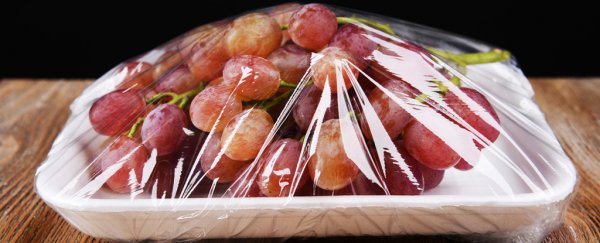Covering leftovers with plastic wrap (aka cling wrap) is a good way of keeping your food fresher for longer, but these films can be fairly limited, because they mainly prevent spoilage by sealing everything off from oxygen.
But a new kind of natural packaging wrap derived from the shells of shrimp and other crustaceans could go significantly beyond the preservation potential of today's plastic wrap. Researchers have spent three years developing their new composite material, which they say can double the shelf-life of perishable food such as bread.
The film's main constituent is chitosan, a polymer synthesised from the exoskeletons of crustaceans. According to team from the National University of Singapore, chitosan is an ideal material for use in food technology applications, as it's bio-degradable and possesses an excellent film-forming ability.
The polymer is also non-toxic, which is important. The use of various synthetic materials in conventional plastic wrap has been an ongoing cause of concern since it was first developed several decades ago, for both health and environmental reasons.
Chitosan also has antimicrobial and antifungal properties, and the researchers have fortified the polymer with grapefruit seed extract (GFSE), which is antioxidant and possesses antiseptic, anti-bacterial, and fungicidal properties.
The resulting composite is comparable in strength and flexibility to regular food wrapping, but its molecular makeup means it can also prevent the growth of fungi and bacteria in foods it's used to cover.
"Increasing attention has been placed on the development of food packaging material with antimicrobial and antifungal properties, in order to improve food safety, extend shelf-life and to minimise the use of chemical preservatives," said mechanical engineer Thian Eng San.
"Consumers are also demanding that packaging materials be formulated from natural materials that are environmentally friendly and biodegradable while improving food preservation."
We should point out that the claims have not yet been peer-reviewed or published, so we can't get too excited just yet, but the team says in their initial testing, the shelf-life of bread samples packaged with chitosan-based GFSE composite films was twice as long as those wrapped in synthetic packaging films.
The next step is additional research to more closely examine the extent of microbial growth in perishables wrapped in the film. They will also work on further improving the composite, which they're looking to commercialise as a packaging material – although the advantages could go far beyond just monetising their creation.
"Extending the shelf-life of food products also means reducing food waste, and as a result, reducing the rate of global food loss," said one of the researchers, Tan Yi Min. "This will bring about both environmental and economic benefits."
